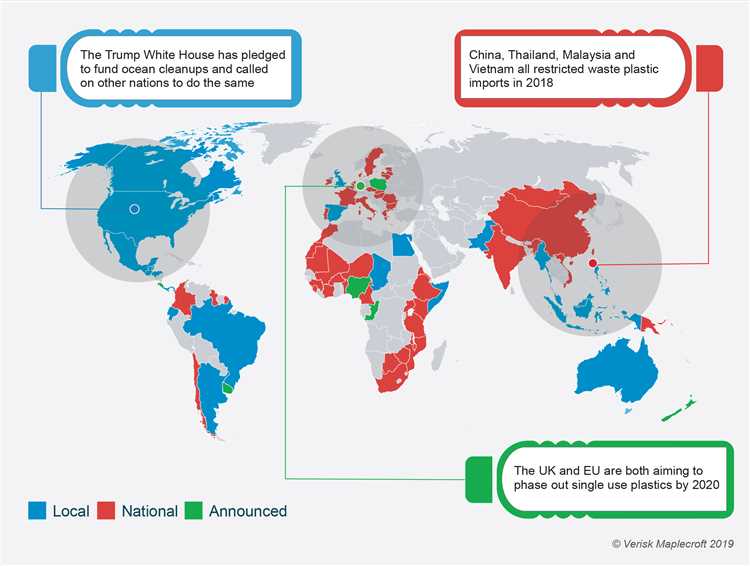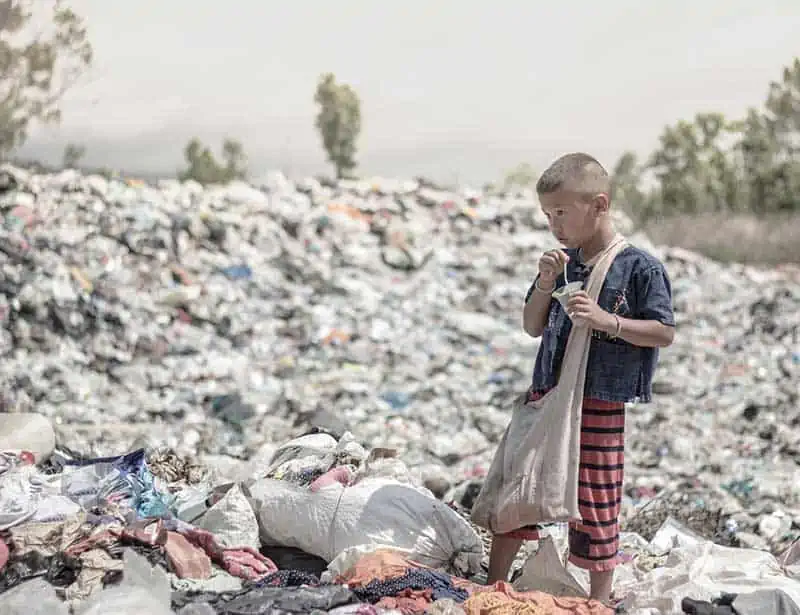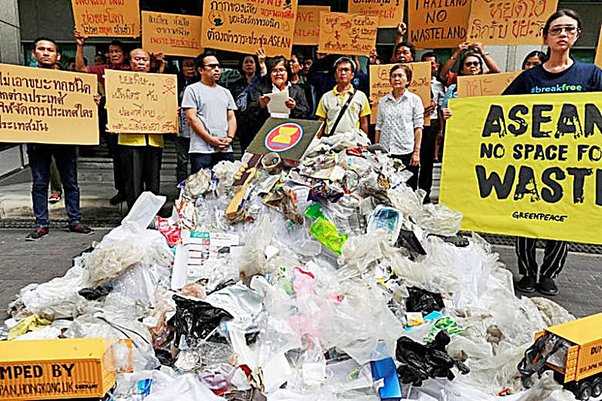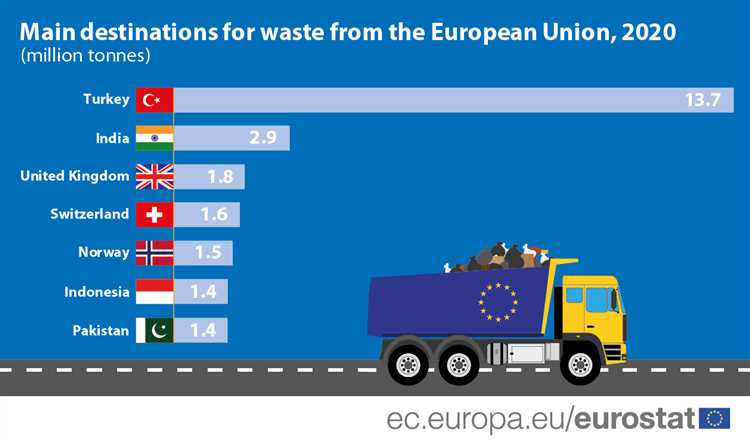
Have you ever wondered what happens to your trash after you throw it away? It turns out that not all garbage ends up in landfills or recycling centers. In fact, some countries are willing to buy trash from other countries.
One country that has been buying garbage is China. For many years, China was the world’s largest importer of recyclable materials, including plastic, paper, and metal. The country’s booming manufacturing industry relied heavily on these materials as a cheap source of raw materials.
However, in January 2018, China implemented a new policy called the National Sword, which banned the import of 24 types of solid waste, including certain plastics and mixed paper. This decision had a significant impact on the global waste trade, as China was no longer willing to take in the world’s garbage.
So, which country stepped up to fill the void left by China? It turns out that several Southeast Asian countries, such as Malaysia, Vietnam, and Thailand, have become major importers of plastic waste. These countries have fewer regulations in place to manage the influx of garbage, making them attractive destinations for countries looking to offload their waste.
- Environmental problems caused by excessive waste
- Pollution
- Habitat Destruction
- International trade of waste materials
- The impact of waste trade on developing countries
- Environmental impact
- Public health concerns
- Case study: China’s ban on waste imports
- Alternative solutions for waste management
- Q&A
- Why would a country want to buy garbage?
- Which country is the biggest buyer of garbage?
- What are the environmental impacts of buying garbage?
- Are there any countries that are selling their garbage?
- What are the economic benefits of buying garbage?
- Why would a country want to buy garbage?
- Which countries are buying garbage?
Environmental problems caused by excessive waste
Excessive waste production has become a major environmental issue worldwide. The increasing population, rapid urbanization, and consumer-driven economy have contributed to the generation of vast amounts of waste on a daily basis. This excessive waste is causing several detrimental effects on the environment, including pollution, habitat destruction, and climate change.
Pollution

The improper disposal of waste leads to pollution of air, water, and soil. When waste is burned in open dumps or incinerators, harmful chemicals and gases are released into the atmosphere, contributing to air pollution. In addition, the leachate produced by landfills can contaminate groundwater and nearby water bodies, leading to water pollution. The accumulation of waste in landfills can also result in soil pollution, making it unsuitable for agriculture or other purposes.
Habitat Destruction

The improper handling of waste can lead to habitat destruction and loss of biodiversity. Illegal dumping or improper landfill management can destroy natural habitats, disrupting ecosystems and endangering animal and plant species. The accumulation of waste in rivers and oceans can harm marine life, including fish, birds, and sea turtles, through entanglement or ingestion of plastic waste. These actions not only harm the environment but also disrupt the delicate balance and functioning of ecosystems.
Furthermore, the production and disposal of waste can contribute to deforestation. The extraction of raw materials for the manufacturing of products, as well as the disposal of waste in landfills or through incineration, can lead to the destruction of forests. Deforestation not only reduces the Earth’s capacity to absorb greenhouse gases but also results in the loss of wildlife habitat and contributes to climate change.
Climate Change
Excessive waste production and disposal contribute to climate change through the release of greenhouse gases. When organic waste decomposes anaerobically in landfills, it produces methane, a potent greenhouse gas that contributes to global warming. The extraction, production, and transportation of raw materials and the manufacturing and disposal of products also generate carbon dioxide emissions, further exacerbating climate change.
In conclusion
Reducing waste generation, promoting waste management practices, and adopting sustainable consumption patterns are essential to mitigate the environmental problems caused by excessive waste. Governments, businesses, and individuals all have a role to play in managing waste more effectively and moving towards a more sustainable future.
International trade of waste materials
The international trade of waste materials, also known as waste trade or waste trafficking, refers to the movement of waste materials between countries for the purpose of recycling, disposal, or other forms of waste management. This trade has become a significant global issue due to its potential environmental, economic, and social implications.
Many developed countries generate large amounts of waste that they are unable or unwilling to manage within their own borders. These countries often export their waste to other countries, particularly developing nations, where waste management regulations may be less strict or where labor costs are lower.
The types of waste that are commonly traded internationally include electronic waste (e-waste), plastic waste, hazardous waste, and scrap metal. E-waste, for example, consists of discarded electronic devices such as computers, smartphones, and televisions, while plastic waste can include various types of plastic bottles, packaging materials, and other plastic products.
The international trade of waste materials has both positive and negative consequences. On the positive side, it can contribute to the global recycling industry, create jobs in countries that receive the waste, and provide access to valuable resources that can be extracted from the waste. However, it can also lead to environmental pollution, health hazards for workers involved in waste management, and social inequities in countries that bear the burden of managing foreign waste.
In recent years, there has been growing concern and criticism regarding the international trade of waste materials. Some countries have implemented stricter regulations and bans on the import of certain types of waste, while others have called for a shift towards a circular economy approach, which emphasizes reducing waste generation and promoting sustainable resource management.
In conclusion, the international trade of waste materials is a complex and controversial issue that requires careful consideration of its environmental, economic, and social impacts. Efforts are being made to address the challenges associated with this trade and to promote more sustainable waste management practices globally.
The impact of waste trade on developing countries
Waste trade, also known as trash trade or waste dumping, refers to the international trade of waste materials between developed and developing countries. While this practice may provide economic benefits for some countries, it often has detrimental effects on the environment and public health in the receiving countries.
Environmental impact
Developing countries that import waste often lack the infrastructure and resources to effectively manage and dispose of it. As a result, the waste can end up in illegal dumpsites or be improperly handled, leading to pollution of the air, water, and soil. This pollution can have long-term consequences for the local ecosystem, including damage to biodiversity and contamination of natural resources.
Public health concerns
The improper handling and disposal of waste can also have serious implications for public health in developing countries. Toxic waste, such as electronic waste or hazardous chemicals, can pose significant health risks to workers and nearby communities. Exposure to these substances can lead to respiratory problems, skin diseases, and other serious illnesses.
| Issues | Impact |
|---|---|
| Water pollution | Contamination of water sources, affecting drinking water quality and aquatic life. |
| Air pollution | Release of harmful gases and particulate matter, contributing to respiratory diseases. |
| Soil contamination | Damage to agricultural lands, reducing crop yields and posing risks to food security. |
| Biodiversity loss | Disruption of ecosystems and loss of species due to pollution and habitat destruction. |
Efforts have been made to regulate waste trade through international agreements and conventions. The Basel Convention, for example, aims to control the transboundary movement of hazardous waste and ensure its environmentally sound management. However, illegal waste trade still persists, highlighting the need for stricter enforcement and increased awareness of the negative impacts of waste dumping on developing countries.
Case study: China’s ban on waste imports
China’s ban on waste imports, which came into effect in 2018, has had a significant impact on global waste management and recycling patterns. The country was once the world’s largest importer of recyclable materials, importing millions of tons of waste from countries like the United States, Europe, and Australia.
The ban was implemented as part of China’s efforts to improve its own environmental standards and reduce the pollution caused by waste processing. The country had been facing numerous health and environmental issues due to inadequate waste management practices.
The ban was felt worldwide, as other countries were suddenly left to find alternative destinations for their waste. This led to a global shift in waste management strategies, as countries were forced to invest in their own recycling infrastructure or find new markets for their waste.
Some countries, such as Malaysia and Vietnam, saw a surge in waste imports after China’s ban. Unfortunately, these countries struggled to handle the massive influx of waste and faced their own environmental and health problems as a result.
This case study highlights the interconnectedness of global waste management and the need for international cooperation and standards. It also emphasizes the importance of reducing waste production and promoting sustainable practices to mitigate the reliance on waste exports.
Alternative solutions for waste management

As the problem of waste management continues to grow, many countries are looking for alternative solutions to effectively and sustainably manage their waste. Here are some innovative approaches being used around the world:
1. Recycling and composting: Many countries are implementing extensive recycling and composting programs to reduce the amount of waste that ends up in landfills. By separating recyclable materials and organic waste, these programs aim to divert waste from traditional disposal methods and instead recycle or repurpose it.
2. Waste-to-energy plants: Some countries are investing in waste-to-energy technology, which involves converting waste into energy through processes like incineration or gasification. These plants not only help reduce the volume of waste but also generate electricity and heat that can be used for various purposes.
3. Circular economy initiatives: The concept of a circular economy focuses on minimizing waste and maximizing resource efficiency by emphasizing recycling, repairing, and reusing products. This approach aims to create a closed-loop system where resources are managed sustainably and waste is minimized.
4. Innovative waste collection systems: Several countries are upgrading their waste collection systems to improve efficiency and reduce waste generation. This includes implementing smart bin systems that use sensors to optimize collection routes and reduce overflowing bins.
5. Education and awareness campaigns: Many countries are placing emphasis on educating their citizens about waste management and the importance of reducing, reusing, and recycling. These campaigns aim to promote responsible waste management practices and encourage individuals to make more sustainable choices.
6. Ban on single-use plastics: Some countries have implemented strict regulations to ban or limit the use of single-use plastics like bags, straws, and bottles. These measures aim to reduce the amount of plastic waste generated and encourage the use of more sustainable alternatives.
By implementing these alternative solutions, countries can effectively manage their waste, minimize the environmental impact, and work towards a more sustainable future.
Q&A
Why would a country want to buy garbage?
There are several reasons why a country would want to buy garbage. One reason is to use it as a source of energy. Some countries have advanced technologies that can convert garbage into electricity or other forms of renewable energy. Another reason is to recycle the garbage and use it as raw materials for manufacturing new products. By buying garbage from other countries, they can ensure a steady supply of recyclable materials.
Which country is the biggest buyer of garbage?
The biggest buyer of garbage is China. For many years, China has been importing large quantities of garbage from various countries around the world. However, in 2018, China implemented a ban on certain types of solid waste imports, which has led to a decrease in its garbage imports.
What are the environmental impacts of buying garbage?
The environmental impacts of buying garbage can vary depending on how it is managed. If the garbage is properly recycled or used as a source of energy, it can help reduce the amount of waste sent to landfills and contribute to a more sustainable waste management system. However, if the garbage is not properly managed and ends up in landfills or incinerators without proper regulations, it can contribute to pollution and other negative environmental effects.
Are there any countries that are selling their garbage?
Yes, there are countries that are selling their garbage. Some countries, especially those with limited land space for waste disposal or without advanced recycling facilities, sell their garbage to other countries that have the technology and infrastructure to handle the waste. This can be a cost-effective solution for waste management for these countries.
What are the economic benefits of buying garbage?
There are several economic benefits of buying garbage. One benefit is that it can create jobs in the waste management and recycling industry. Recycling and converting garbage into energy can require specialized skills and create employment opportunities. Additionally, buying garbage can also be a cost-effective solution for countries that need raw materials for manufacturing. By buying recycled materials from other countries, they can reduce their reliance on virgin resources and save costs.
Why would a country want to buy garbage?
Some countries buy garbage because it can be used as a resource. For example, recycling facilities can process the garbage and turn it into new products. This helps reduce the need for raw materials and helps promote a circular economy.
Which countries are buying garbage?
Several countries are buying garbage for various reasons. China used to be one of the largest importers of trash, but in 2018, they imposed stricter regulations and now accept only high-quality recyclables. Other countries like Malaysia, Indonesia, Vietnam, and India have stepped in to fill the gap and are accepting garbage imports.